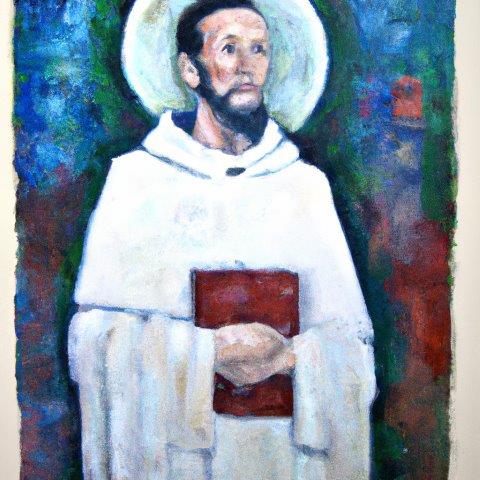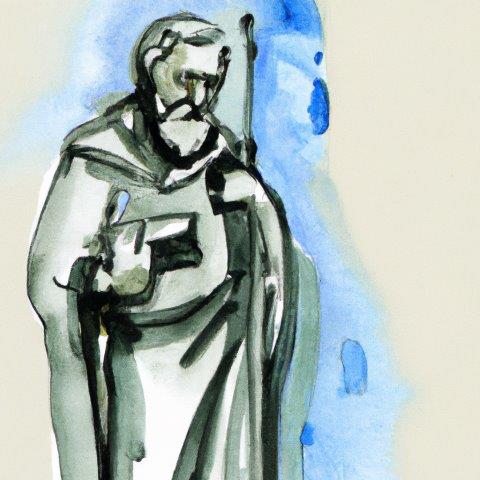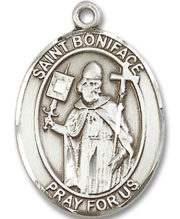Saints
St. Boniface
St. Boniface Biography
 St. Boniface was a 8th-century English monk and missionary who is considered the Apostle of Germany for his role in spreading Christianity in that region. He was born in the kingdom of Wessex in England in the year 675 AD and was originally named Winfrid. He received a strong monastic education and became a monk at the monastery of Nursling, in Winchester.
St. Boniface was a 8th-century English monk and missionary who is considered the Apostle of Germany for his role in spreading Christianity in that region. He was born in the kingdom of Wessex in England in the year 675 AD and was originally named Winfrid. He received a strong monastic education and became a monk at the monastery of Nursling, in Winchester.
In 716, he traveled to Rome where Pope Gregory II gave him the name “Boniface” and commissioned him to spread Christianity in Germany. He began his mission in the German lands, establishing monasteries and converting the local population to Christianity. He preached to the Germanic tribes, many of whom were still pagans, using a combination of persuasion and force.
In 722, he founded the famous abbey of Fulda, which was to become a center of learning and culture for centuries to come. He also founded several other religious houses, including the Monastery of St. Peter and Paul in Mainz and the Monastery of St. Martin in Fritzlar. He also established dioceses, ordained priests, and built churches throughout the region, consolidating the Christianization of Germany.
Boniface was not only a missionary, he was also a skilled organizer, and politician. He played a key role in creating a network of dioceses, monasteries and bishoprics that allowed the Christian church to gain a foothold in the Germanic lands, and he also cooperated with the Carolingian dynasty to establish a stable political framework for the Christianization of the region.
In 732, Boniface journeyed to Frisia, a pagan region on the North Sea coast. He and his companions were murdered by the local inhabitants while they were preparing to baptize converts. Boniface’s death was seen as a martyrdom, and his followers soon spread the news of his martyrdom, his life and his teaching through Europe, which contributed to the further spread of Christianity in the region.
After his death, Boniface became a cult figure and his tomb in Fulda became a popular pilgrimage site. He was canonized by Pope Adrian II in 754, and he is now venerated as a saint by the Catholic Church and the Anglican Communion. His feast day is celebrated on June 5th.
St. Boniface’s work in spreading Christianity in Germany was of great significance. His efforts to convert the Germanic tribes and his organization of the church in the region had a lasting impact on the development of Christianity in Europe. He also played a key role in the development of the German language and literature, and his legacy continues to be celebrated in many German churches and institutions.
The Life of St. Boniface
 St. Boniface, the apostle of Germany, was an Anglo Saxon, born in Devonshire, England, in 680, and received the name Winfrid at his Baptism. At only five years old, some holy Benedictine Monks preaching in that country came to his father’s home. Winfrid was deeply impressed and longed to be a religious, but his father exerted his authority to change the boy’s mind until the Winfrid became seriously ill. His father took the illness as the hand of God chastising him for opposing his son’s vocation, so he left Winfrid free to pursue his vocation.
St. Boniface, the apostle of Germany, was an Anglo Saxon, born in Devonshire, England, in 680, and received the name Winfrid at his Baptism. At only five years old, some holy Benedictine Monks preaching in that country came to his father’s home. Winfrid was deeply impressed and longed to be a religious, but his father exerted his authority to change the boy’s mind until the Winfrid became seriously ill. His father took the illness as the hand of God chastising him for opposing his son’s vocation, so he left Winfrid free to pursue his vocation.
Taking the Name Boniface
At thirteen years of age St. Boniface was sent to Exminster to be educated, and before he left he received the religious Habit of the Benedictines, taking the name of Boniface. He was ordained to the priesthood when thirty years old, and was so highly thought of by his superiors, that he was entrusted with an important commission to the Archbishop of Canterbury. Night and day, St. Boniface bewailed the misfortune of those people living in idolatry. In 716, he went into Friesland to preach the Gospel, though his mission failed. Upon his return to England, he was chosen Abbot of the monastery.
Preaching
In 718, Saint Boniface went to Rome to ask the Pope’s blessing on his proposed new mission, and received his authority to preach to the German tribes. He began with Bavaria and Thuringia, and his life was in constant danger. The work was slow, but his courage never failed. The next visited Friesland, Hesse and Franconia, everywhere striving to enlighten the infidels. In 723, Pope Gregory II consecrated Boniface to Bishop, with full jurisdiction over the German tribes. He continued his spiritual conquests, and founded many churches and monasteries throughout the country. Obtaining new laborers from England, he stationed them in Hesse and Thuringia.
Martyrdom of St. Boniface
In 732, the new Pope, Gregory III, constituted St. Boniface Archbishop and Primate of all Germany; in 738, Papal Legate, and in 747, Archbishop of Mainz. Several years before his death he founded the Abbey of Fulda (where his body now rests), as the center of all German missionary work. Although advanced in years, St. Boniface appointed a successor to his monastery and set out to convert a pagan tribe. One day, while waiting to administer Confirmation to some newly-baptized Christians, a band of enraged infidels rushed into the tent. His attendants desired to resist them, but St. Boniface would not permit it, declaring that the day he had long awaited was come, which would bring him to the eternal joys of the Lord. Then he encouraged the rest to meet with cheerfulness and constancy a death which would be to them the gate of everlasting life.
Saint Boniface, at the age of seventy-five, was martyred on June 5, 755, at Dokkum, with fifty-two of his companions. Innumerable miracles have been wrought by God through the intercession of St. Boniface.
Prayers to St. Boniface
Prayer written by St. Boniface
Eternal God, the refuge and help of all your children,
we praise you for all you have given us,
for all you have done for us,
for all that you are to us.
In our weakness, you are strength,
in our darkness, you are light,
in our sorrow, you are comfort and peace.
We cannot number your blessings,
we cannot declare your love:
For all your blessings we bless you.
May we live as in your presence,
and love the things that you love,
and serve you in our daily lives;
through Jesus Christ our Lord.
Prayer of Intercession to St. Boniface
O God,
through the zeal of your martyr and bishop blessed Boniface,
you brought a great multitude of peoples to the knowledge of your Name;
grant that we may enjoy the protection of him whose feast we celebrate.
Through our Lord Jesus Christ, your Son,
who lives and reigns with you in the unity of the Holy Spirit,
God, for ever and ever.
Amen.
Prayer for Missionaries
O holy apostle, St. Boniface, you boldly preached the Gospel in Germany and gave your life for the faith. Pray for all who proclaim the Good News today, that they may have the courage and zeal of the Holy Spirit to bring many to Christ. Amen.
Prayer for Courage and Strength
St. Boniface, you faced opposition and danger while spreading the word of God. Help us to have your courage and strength in the face of adversity, and guide us on our journey to serve the Lord. Amen.
Prayer for Conversion of Hearts
St. Boniface, you converted many to the faith through your words and deeds. Pray for us that our own words and actions may bring others closer to God, and that our hearts may be open to His will in all things. Amen.
Popular St. Boniface Medal and St. Boniface Rosary
St. Boniface: The Patron Saint of Germany and Missionaries
 St. Boniface, also known as Winfrid or Wynfrith, was a celebrated figure in the history of the Catholic Church and is widely recognized as the patron saint of Germany and missionaries. Born in England in the 7th century, St. Boniface was a Benedictine monk who devoted his life to the conversion of the Germanic tribes to Christianity.
St. Boniface, also known as Winfrid or Wynfrith, was a celebrated figure in the history of the Catholic Church and is widely recognized as the patron saint of Germany and missionaries. Born in England in the 7th century, St. Boniface was a Benedictine monk who devoted his life to the conversion of the Germanic tribes to Christianity.
St. Boniface’s mission work took him throughout Germany, where he established numerous monasteries and churches and worked tirelessly to spread the gospel. He is credited with playing a key role in the Christianization of the Germanic people and is remembered for his tireless efforts to bring the light of the gospel to those who had never heard it before.
In recognition of his contributions to the spread of the Christian faith, St. Boniface was canonized as a saint by the Catholic Church and is revered to this day as one of its greatest missionaries. He is widely recognized as the patron saint of Germany, where his legacy continues to inspire generations of Christians to serve the Lord in their own communities.
St. Boniface’s feast day is celebrated on June 5th, and it is customary for Catholics to attend Mass in his honor and to pray for the continued growth of the Church in Germany and throughout the world.
In conclusion, St. Boniface is the patron saint of Germany and missionaries because of his tireless efforts to spread the gospel and convert the Germanic tribes to Christianity. He remains an inspiration to all who seek to embody the ideals of mission work and service to the Lord in their own lives.
Reflection on the feast day of St. Boniface
The feast day of St. Boniface is June 5th.
Today, as we celebrate the feast day of St. Boniface, we are reminded of the power of faith and the importance of spreading the Gospel message. St. Boniface was a missionary bishop and a martyr, who is known for his tireless efforts in spreading Christianity throughout Germany and other parts of Europe during the 8th century.
As we reflect on St. Boniface’s life, we are reminded of the courage and conviction that he had in the face of great opposition and danger. He was willing to risk his life to bring the Good News of Jesus Christ to the people, and his efforts were instrumental in the conversion of many to the Christian faith.
St. Boniface reminds us that our faith is not meant to be kept to ourselves, but is meant to be shared with others. In a world that is often hostile to the message of Christianity, it can be easy to keep our faith to ourselves and not share it with others. But, like St. Boniface, we are called to be bold in our witness to the Gospel, and to share the love and truth of Jesus Christ with others.
We are also reminded by St. Boniface that our faith should not be limited by borders, culture or language. He worked on bringing the Gospel to the people, regardless of their background and language, he understood that the message of love and salvation is for everyone.
In this feast of St. Boniface, let us reflect on our own faith and the ways in which we share it with others. May we be inspired by the example of St. Boniface and may we strive to be more like him in our own efforts to spread the Gospel message. May we be filled with the courage and conviction that he had, to be bold in our witness to the Good News of Jesus Christ, to everyone we meet.
Discover biographies, prayers, and reflections for more than 400 Catholic Saints
Saints Similar to St. Boniface
You may also be interested in reading the St. Cuthbert of Lindisfarne. St. Boniface and St. Cuthbert of Lindisfarne were early Christian missionaries and played important roles in the Christianization of Europe. St. Boniface was a missionary to the Germanic peoples. St. Cuthbert was a monk and bishop in Northumbria. Next up: Biography of St. Brendan the Navigator
Also check out our handmade St. Boniface Medal and St. Boniface Rosary and St. Boniface Rosary Bracelet.




